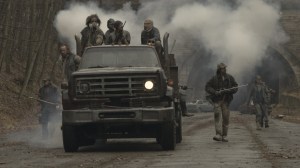The trailer for 28 Years Later has hit, and horror movie fans have certainly taken notice, as the trailer has amassed 8.7 million views on its first day of release, becoming the #1 trending video. It’s not just the brand name of the 28 Days Later and 28 Weeks Later franchise causing such hype: this first cut of footage from the original creative team of director Danny Boyle and writer Alex Garland is a nerve-wracking and hauntingly ominous montage of dread, set in a dystopian version of the UK. The rage-zombie virus seems to be very much still active (in whatever form or fashion) as a man named Jamie (Aaron Taylor-Johnson) ventures out of a quarantine zone and witnesses how the world has been changed over nearly three decades living with the virus and infected.
Videos by ComicBook.com
The key piece of audio in the 28 Years Later is a spoken-word reading of the of the Rudyard Kipling poem “Boots” by American actor Taylor Holmes from 1915. As fans are quickly discerning, the poem wasn’t included just for its freaky repetitive cadence: the context and themes of the poem may foreshadow the context and themes of 28 Years Later‘s storyline.
What Is 28 Years Later About?
“It’s been almost three decades since the rage virus escaped a biological weapons laboratory, and now, still in a ruthlessly enforced quarantine, some have found ways to exist amidst the infected. One such group of survivors lives on a small island connected to the mainland by a single, heavily-defended causeway. When one of the group leaves the island on a mission into the dark heart of the mainland, he discovers secrets, wonders, and horrors that have mutated not only the infected but other survivors as well.”
The Meaning & History of Rudyard Kipling’s “Boots” Poem
The poem “Boots” imagines the thoughts of a British Army infantryman stationed in South Africa during the Second Boer War between the British Empire and the Boer republics over influence in Southern Africa. Because the infantrymen have no clear campaign they are made to march across the region, and the speaker is slowly going mad from days of seeing nothing by his boots and the boots of nearby soldiers in line marching up and down without end. The marching continues through all the tolls of warfare, but the men cannot rest or stop and there’s no escape from the cycle of horror, as “there’s no discharge in the war!” The numbers counted off represent the stretches of miles the men have been made to march (“Four-eleven-seventeen-thirty-two-the day before…”) and Kipling snuck in the Easter egg of timing the lines to the cadence of actual infantry marches.
Taylor Holmes 1915 audio recording of “Boots” has been implemented into actual military training – namely America’s Survival, Evasion, Resistance, and Escape (SERE) program, first developed during WWII. The recording has been allegedly used as a means of putting cadets under psychological duress while training them in evasion of capture, wilderness survival, and escape from hostile environments – not to mention, the controversial “teaching” of resistance to interrogation and torture while captured. “Boots” is spoken of anecdotally by many who have been through SERE, as the “soundtrack” to sessions of being starved, tortured, and imprisoned, which has only made Taylor Holmes’ performance of the poem live on in quiet infamy for decades.
What Does “Boots” Poem Mean for 28 Years Later?
28 Years Later is clearly patining the portrait of a world that has not just collapsed from the Zompocalypse (like in the first film), but has now gone mad from living in that hellscape for so long. There are already hints of evolving forms of the rage zombies – and human threats like a crazy-looking Ralph Fiennes who seems like he could be working with Team Zombie.
The monotony of living a quarantined life (or conversely, surviving in a zombie-filled hell where everyone you know dies) could turn out to be the real “threat” that causing what’s left of humanity to unravel. 28 Years Later’s trailer features teases of some kind of enduring military force, so that “Boots” poem will probably hit different for those kids. Finally, the poem could directly reference the main storyline of Aaron Taylor-Johnson’s character leaving quarantine on some kind of quest and his psychological arc of needing to press on through the nightmare world he encounters outside his haven.
Based on the poem’s implications, we should not expect 28 Years Later to end this trilogy on a happy note. RIP Jim…
28 Years Later will be released in theaters on June 20, 2025.








